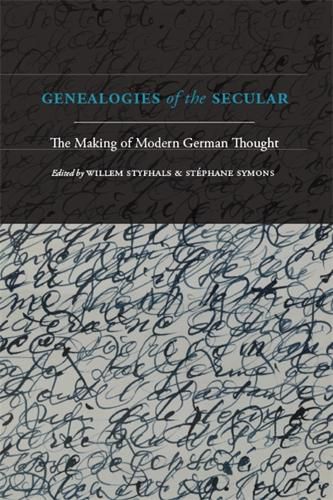Readings Newsletter
Become a Readings Member to make your shopping experience even easier.
Sign in or sign up for free!
You’re not far away from qualifying for FREE standard shipping within Australia
You’ve qualified for FREE standard shipping within Australia
The cart is loading…






This title is printed to order. This book may have been self-published. If so, we cannot guarantee the quality of the content. In the main most books will have gone through the editing process however some may not. We therefore suggest that you be aware of this before ordering this book. If in doubt check either the author or publisher’s details as we are unable to accept any returns unless they are faulty. Please contact us if you have any questions.
While the concept of secularization is traditionally used to define the nature of modern culture, and sometimes to uncover the theological origins of secular modernity, its validity is being questioned ever more radically today. Genealogies of the Secular returns to the historical, intellectual, and philosophical roots of this concept in the twentieth-century German debates on religion and modernity, and presents a wide range of strategies that German thinkers have applied to apprehend the connection between religion and secularism. In fundamentally heterogeneous ways, these strategies all developed genealogies of the secular by tracing modern phenomena back to their religious or theological roots. This book aims to disclose the complex prehistory of the contemporary debates on political theology and postsecularism, and to show how prominent thinkers continue this German tradition today. It explores and assesses the classic theories of secularization that are epitomized in Carl Schmitt’s writings on political theology, but also addresses German philosophers whose work has been rarely associated with secularization, including Walter Benjamin, Ernst Cassirer, Martin Heidegger, Immanuel Kant, and Hannah Arendt. Attention is also paid to two thinkers whose role in these discourses has not been fully explored yet: Jacob Taubes and Jan Assmann. By introducing their thinking on religion, politics, and secularization, the book also makes two of their own key texts available to an English-language readership.
$9.00 standard shipping within Australia
FREE standard shipping within Australia for orders over $100.00
Express & International shipping calculated at checkout
This title is printed to order. This book may have been self-published. If so, we cannot guarantee the quality of the content. In the main most books will have gone through the editing process however some may not. We therefore suggest that you be aware of this before ordering this book. If in doubt check either the author or publisher’s details as we are unable to accept any returns unless they are faulty. Please contact us if you have any questions.
While the concept of secularization is traditionally used to define the nature of modern culture, and sometimes to uncover the theological origins of secular modernity, its validity is being questioned ever more radically today. Genealogies of the Secular returns to the historical, intellectual, and philosophical roots of this concept in the twentieth-century German debates on religion and modernity, and presents a wide range of strategies that German thinkers have applied to apprehend the connection between religion and secularism. In fundamentally heterogeneous ways, these strategies all developed genealogies of the secular by tracing modern phenomena back to their religious or theological roots. This book aims to disclose the complex prehistory of the contemporary debates on political theology and postsecularism, and to show how prominent thinkers continue this German tradition today. It explores and assesses the classic theories of secularization that are epitomized in Carl Schmitt’s writings on political theology, but also addresses German philosophers whose work has been rarely associated with secularization, including Walter Benjamin, Ernst Cassirer, Martin Heidegger, Immanuel Kant, and Hannah Arendt. Attention is also paid to two thinkers whose role in these discourses has not been fully explored yet: Jacob Taubes and Jan Assmann. By introducing their thinking on religion, politics, and secularization, the book also makes two of their own key texts available to an English-language readership.